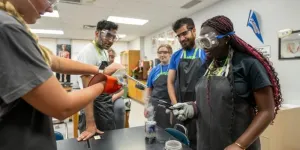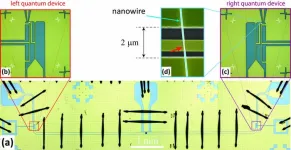Researchers from DZNE and Otto von Guericke University Magdeburg have identified individuals with increased risk for dementia using mobility data, recorded during a smartphone-based wayfinding task on the university campus. The findings, reported in the journal PLOS Digital Health, show the potential of smartphone data, collected in conditions close to everyday life, for the early detection and monitoring of Alzheimer’s disease. The study included 72 adults; about a third of them with subjective cognitive decline (SCD), a condition that is a known risk factor for dementia.
Alzheimer’s disease usually develops unnoticed over years and eventually leads to dementia. To date, there is no cure. “Currently, Alzheimer’s is often treated too late to ensure effective therapy. Even the new antibody drugs that are being much discussed at the moment only work if they are given at an early stage. Thus, we need to be able to diagnose the disease earlier, when symptoms are still mild. This requires advances in diagnostics,” says Dr. Anne Maass, a research group leader at DZNE and guest professor at the University Magdeburg. With colleagues, she now tested a novel approach to assessing problems in spatial navigation, as one of the first potential symptoms of Alzheimer’s disease.
App in use
“Our study is based on a kind of scavenger hunt where participants had to find pre-specified points-of-interest. For this, they used a smartphone equipped with a special app that we developed,” explains Dr. Nadine Diersch. The neuroscientist initiated the research project at DZNE several years ago and today works in the private sector, but continues to be associated with DZNE as a guest researcher. “We found that certain app data allow to reliably identify people with an increased risk for dementia,” she says. “This shows that digital technologies, like mobile apps, offer completely new possibilities to assess cognitive functioning under realistic, low-threshold conditions. In the future, this, may help detect subtle cognitive changes and thus harbingers of dementia earlier than today.”
“Scavenger hunt” on the campus
In total, 72 women and men between the ages of their mid-twenties and mid-sixties participated in the study. Of the 48 older individuals, 23 were diagnosed as SCD patients. People with this condition perceive a loss of mental capacity, which, however, cannot be detected by conventional neuropsychological tests. These individuals do not inevitably develop dementia. However, it has been shown that they are at an increased risk. All study participants were instructed to independently find several buildings on the medical campus of the University Magdeburg, guided by the app, while their movement patterns were tracked by GPS. “Our participants had similar knowledge of the campus area and they were all experienced in using smartphones. We also practiced using the app beforehand,” explains Jonas Marquardt, first author of the study and PhD student in the research group of Anne Maass.
Assessing the sense of direction
During the task, which every study participant had to perform individually, five buildings had to be visited in a row along a route of about 800 meters. The app served as a pacemaker: It displayed a map with the current position and the next destination, including a photo of it. However, the map disappeared as soon as a participant started walking. “The participants had to memorize the layout of the streets, their position and their destination, and then follow their sense of direction and spatial memory,” Marquardt says. “If they got lost, they could press a help button in the app. The map, their position and their destination would then briefly reappear.” The researchers leveraged the GPS data to generate individual mobility profiles and other information.
Suspicious stops
In most cases, the participants reached the five destinations in less than half an hour. “Overall, the younger participants performed better. On average, they walked shorter distances and generally did not use the help function as often as the older ones,” says Marquardt. The differences between the older adults with and without SCD were mainly reflected in the number of so-called orientation stops. Jonas Marquardt explains: “Older adults with SCD briefly stopped during walking more often, presumably to orient themselves, than older adults without SCD. In fact, we were able to identify participants with SCD based on this parameter.”
Perspectives for early detection
So far it is unclear why people with SCD stand out in this regard. “We found that they tend to hesitate more at intersections in particular. This suggests that certain decision-making processes are altered. However, the data are not yet conclusive,” Nadine Diersch explains. “Nevertheless, the results of our study are a promising proof of concept. They show that smartphone data can help detect subtle signs of cognitive decline in realistic contexts.” The scientist considers this an opportunity for early detection and early treatment of dementia: “I could imagine such apps being used in the future to identify people at risk and then decide whether further testing or already therapy is needed.”
---
Funding: This work was funded by the Deutsche Forschungsgemeinschaft (DFG, German Research Foundation) within the Collaborative Research Centre “Neural Resources for Cognition” and a DZNE Innovation-2-Application Award.
About Deutsches Zentrum für Neurodegenerative Erkrankungen, DZNE (German Center for Neurodegenerative Diseases): DZNE is a research institute for neurodegenerative diseases such as Alzheimer’s, Parkinson’s and ALS, which are associated with dementia, movement disorders and other serious health impairments. To date, there are no cures for these diseases, which represent an enormous burden for countless patients, their families and the healthcare system. DZNE is dedicated to the development and translation into practice of novel strategies for prevention, diagnosis, care and treatment. The institute comprises ten sites across Germany and collaborates with universities, university hospitals, research centers and other institutions in Germany and throughout the world. It is state-funded and a member of the Helmholtz Association and of the German Centers for Health Research. www.dzne.de/en
Otto von Guericke University Magdeburg was founded in 1993 with the merger of the Technical University of Magdeburg, the University of Education and the Magdeburg Medical Academy. As a university with an international profile, it offers a wide range of courses in the fields of engineering, natural sciences, economics, social sciences and medicine. The university is characterized by a strong interdisciplinary approach to research and teaching, particularly in the fields of neuroscience, medical technology, mechanical engineering, electrical engineering and information technology. Named after the inventor and mayor of the city of Magdeburg, Otto von Guericke, the university is an attractive location for students and academics from all over the world thanks to its modern infrastructure, excellent teaching and international orientation. www.ovgu.de/en/
END

